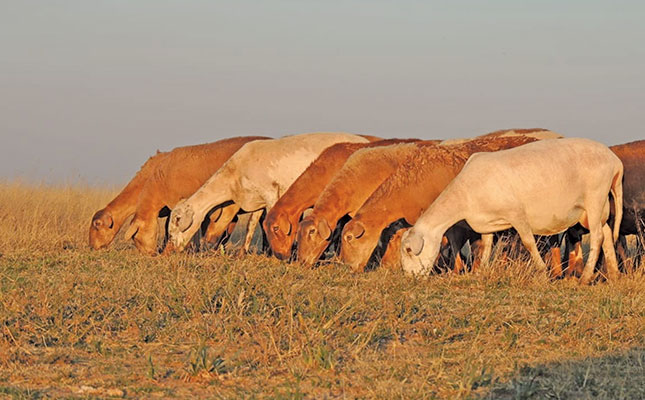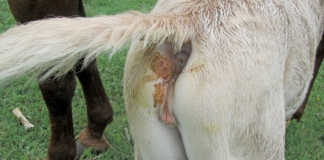
Photo: Nico Grobler
The most dominant roundworm in South Africa’s summer rainfall areas is Haemonchus contortus.
Known as wireworm (haarwurm) in South Africa and barber’s pole worm elsewhere, it is a blood-sucking parasite that targets sheep and goats, and can cause substantial blood loss in affected animals. It is particularly rife from February to May.
According to Nico Grobler, who keeps a 300- head Meatmaster flock near Ventersdorp in North West, wireworm can seriously threaten the long-term sustainability of a sheep flock and is the greatest hazard to sheep farming in his area.
“My objective is eventually to eradicate all animals in the flock that need treatment for wireworm. To that effect, I only use rams that have never been dosed for wireworm,” he says.
Grobler and his team use the FAMACHA system to evaluate the animal’s anaemia level and thereby the extent of wireworm infestation and whether or not treatment is required. This is done by comparing the colour of the mucus membrane on the sheep’s lower inner eyelid with the colours on a standardised ‘eye score’ card.
To cull or not to cull?
Very few of the ewes that need to be treated for the parasite are allowed to remain in Grobler’s flock, while rams needing treatment are culled without exception.
The ewes are weighed and monitored monthly according to the FAMACHA system. The decision of whether or not to cull is based on the infected animal’s genetic merit and the value of the contribution she makes to the stud.
A variety of products are used to treat infected animals to prevent the development of resistance.
Grobler says he simply cannot afford any animal that threatens the health status of the flock.
“I replace 20% of the ewes annually. By continually replacing them with wireworm-resistant animals, I’m well on the way to having a flock that’s entirely unaffected by the parasite. So far this year, I’ve had to treat only about 20% of the adult ewes, despite the extremely high rainfall of 800mm.”
To illustrate the value of rigorous selection for resistance, Grobler says that 80% of the progeny of a particular ram that was dosed once contracted wireworm in 2019, although the ram fared exceptionally well in veld tests. However, only 20% of the progeny of a ram that was never dosed were affected by the parasite in 2019.
Resistant indigenous breed
The Meatmaster is a composite sheep breed developed in South Africa from a number of breeds, including the indigenous Damara.
It has natural genetic resistance to parasites, making it a particularly desirable breed in this environment; it resists endoparasites, including gastrointestinal parasites such as wireworm and tapeworm, as well as ectoparasites such as ticks and mosquitoes.
The resistance of indigenous breeds to parasites and their ability to maintain reproductive efficiency under sometimes highly challenging conditions have developed over thousands of years.
Grazing
The Kern stud is kept on 200ha of leased sourveld. The grazing consists mainly of red grass (Themeda triandra), steekgras (Heteropogon contortus) and turpentine grass (Cymbopogon caesius). Bankrupt bush (Seriphium plumosum), a highly unpalatable encroacher, is also present, but Grobler says that the Meatmasters, being non-selective grazers, have almost eliminated the problem on the farm.
Conditions on the farm are tough. Between 2014 and 2018, rainfall never exceeded 300mm a year, while 550mm fell in 2019 and 800mm in 2020. The average temperatures fluctuate between below freezing in winter and the high 30s in summer.
Grobler, his father Klaas and mother Sonia started the Kern Stud in 2007, building the flock using the best available genetics from the outset. The objective was to breed veld-adapted, hardy, functional sheep that conformed to, and even exceeded, breed standards.
Exceptional growth, fertility and carcass quality set Kern Meatmasters apart. The animals are renowned for their even fat distribution and body length and depth, and their carcasses earn a considerable premium on the private slaughter market.
Grobler maintains an average annual weaning percentage exceeding 200% and an average weaning weight of between 33kg and 35kg.
Breeding goals
Kern ewes are strong, hardy and feminine, with a functional, efficient body conformation and well-placed legs for excellent walking ability. Grobler selects for a well-balanced ewe, as this ensures optimal functionality.
The rams are balanced and masculine, with sturdy forequarters. They are strong
and muscular, with a good balance between length, width and depth.
Adequate breadth between the front legs is important, as well as strong hocks in both the front and rear legs. Grobler selects ruthlessly against anything that may impair agility and walking ability. The rams must be virile and have excellent servicing ability.
A strong and well-defined Roman nose is important, as this is a clear indication of Damara genetics. Grobler says it is vital to retain as many of the indigenous bloodlines as possible, because these underpin the well-known functionality and adaptability of the breed.
“Kern Meatmasters’ breeding objective is to breed money-making sheep that need as few production inputs as possible while still realising maximum income. The composite Meatmaster has from the onset been developed along economical lines,” he explains.
The Meatmaster has short, shiny hair with an underlying blanket of fluffy, fine wool.
One of Grober’s breeding objectives is to produce animals with dense coats for maximum isolation against climatic extremes and added protection against ectoparasites.
Guard dogs
The Meatmaster’s highly developed flocking instinct makes for easier mustering and management, especially under rugged and extensive farming conditions, and also increases protection against predators.
In addition, Grobler has developed a number of ways to counter stock theft and predation, which are challenges that livestock farmers in the Ventersdorp area have to contend with.
He kraals the flock at sunset and lets it out again at 7.30am. He also makes use of sheepdog crosses that stay permanently with the animals as guard dogs. When the pup is six or seven weeks old, it is placed in a small kraal with five or six young ewes and left there for a month without any human interaction, enabling the dog and the ewes to bond.
After a month, the dog and the ewes are moved to the flock, where the dog will stay for the rest of its life.
Grobler says he prefers sheepdog crosses, as purebred sheepdogs’ herding instinct is so strong that they interfere when he works with the sheep. He finds sheepdog-boerboel crosses particularly effective, especially against predators such as black-backed jackal and caracal.
According to him, the dogs are extremely protective.
“They become part of the sheep family, so to speak. It’s very endearing to see the sheep and dogs interacting. There’s mutual acceptance and they show affection to one another.”
Chickens
Indigenous chickens add another dimension to the farming concern. Grobler, his wife Marize and even their 17-month-old son, Hannes, are passionate about the brightly coloured chickens that scrurry around the homestead looking for food. His ultimate aim is to breed a no-fuss backyard chicken (werfhoender) along the lines of the Venda chicken.
He says the chickens are highly effective at reducing populations of insect pests, expecially flies.
Email Nico Grobler at [email protected].









